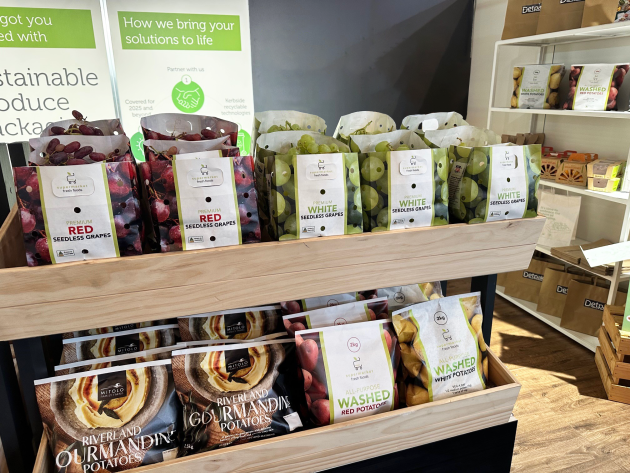With sustainability now a baseline expectation, fibre-based packaging is setting the pace, offering the strength, versatility and appeal needed to replace traditional plastic formats. PKN takes a closer look at Detpak’s role in this advancement.

Smart design, sustainability and scalable manufacturing are converging to reshape packaging solutions in the FMCG sector according to Mark Rohrlach, industrial regional manager for Australasia at Detpak. He is of the view that packaging has evolved from being “just the box stuff came in” to becoming a critical component that must be “smarter, greener, and more functional”. He notes that fibre-based packaging is now leading the shift, as the industry faces increasing pressures from sustainability goals, automation and changing consumer expectations.

“Fibre’s not just following the sustainability trend, it’s driving the bus,” he says. However, Rohrlach stresses the need to balance environmental responsibility with functionality, especially in sectors like chilled and fresh produce. He says recent advances in fibre technology have made it suitable for a wider range of uses, likening it to a barista that can “do a hot, a cold or an oat milk latte”.
Rohrlach outlines how the FMCG and industrial sectors are undergoing rapid transformation, driven by sustainability targets, automation and changing consumer demands. Retailers, producers and consumers are applying pressure for packaging that reduces waste, improves efficiency, and enhances product appeal. “Packaging used to be just a container, now it’s the brains of the operation,” he says.
Consumer expectations are also rising. Rohrlach says packaging is now expected to be recyclable, convenient, clearly labelled and aligned with environmental values. “It’s not just about function anymore, it’s about values.” He adds that packaging now plays a critical role in purchase decisions and brand loyalty. “A well-designed pack can win hearts, wallets and repeat business.”
In his presentation, Rohrlach notes that transparency and sustainability are no longer market differentiators, they are baseline expectations in the FMCG sector.
He also addresses the impact of emerging regulations, including Extended Producer Responsibility (EPR), which he says will challenge traditional packaging formats and cost models. With EPR coming, “it’s not a matter of if, it’s when… like waiting for a delayed flight, you just have to have your bags ready”.
Collaboration drives change
One example he points to is Detpak’s collaboration with Perfection Fresh and 12 growers to deliver new grape packaging for Coles. Perfection Fresh had previously used single-use soft plastic bags for its grapes, which could not be kerbside recycled and, according to the company, lacked the premium look and feel the brand aspired to. In addition to recyclability, the business needed to protect its product quality, as grapes are particularly sensitive to moisture loss and temperature fluctuations. The company also recognised that any change in packaging would need to maintain the existing speed and efficiency of packing lines to avoid operational disruption.
The brief to Detpak was clear: create a recyclable paper bag that matched the volume capacity of existing plastic packaging, preserved cooling and shelf life to prevent food waste, maintained product visibility during the transition from plastic to paper, contributed to growth in category share and reinforced its premium positioning, and could withstand the rigours of the complex fruit and vegetable supply chain. Cost-effectiveness was also a factor – the new solution had to deliver on sustainability without creating prohibitive cost barriers for retailers or consumers.
Through Detpak’s innovation lab, LaunchPad, the team developed the RecycleMe SOS Grape Bag – a kerbside recyclable, paper-based solution that integrates ventilation holes for breathability, offers moisture resistance, and maintains packaging strength, while delivering a premium look and feel. Detpak’s R&D team trialled multiple prototypes to fine-tune the balance between durability and breathability, ensuring that the paper structure could handle high-humidity storage conditions without compromising on appearance or integrity.
The final bag (pictured above) uses 71 per cent less plastic than its predecessor, retaining only minimal plastic elements where absolutely necessary, and was designed to work seamlessly within existing packing processes – a critical requirement for widespread adoption. To ensure the new design would resonate with shoppers, Detpak and Perfection Fresh tested visual elements, landing on a premium aesthetic that emphasised the quality of the fruit while communicating sustainability credentials clearly.
In-market success
The initial launch, featuring Perfection Fresh’s Autumn Crisp grapes, was supported by Coles, with in-store point-of-sale materials highlighting the recyclability of the new bag. Consumer feedback indicated strong acceptance, with shoppers responding positively to both the look and feel of the packaging and its environmental benefits. Building on this success, the program was scaled up with Costa Group joining the initiative, enabling a broader rollout across more grape varieties and retail locations.
Detpak says the in-market success was the result of close collaboration between Perfection Fresh’s marketing, sales and operations teams and its own design, production, sustainability and R&D teams. This alignment meant challenges – such as fine-tuning the ventilation pattern to optimise grape freshness – could be solved quickly, and packaging runs could be adjusted in real time to meet seasonal demand. The case stands as a model for how the FMCG sector can bring fibre-based solutions to market rapidly, without compromising product integrity or brand appeal.
“We’re not solving this alone,” Rohrlach says, noting the project as an example of how co-creation ensures packaging meets performance needs while advancing environmental responsibility. He emphasised that greater integration between brands, suppliers, machinery partners and tech providers is essential, particularly as the industry explores the adoption of barrier technologies to support fibre formats. While promising, many barrier options remain costly and complex to implement at scale.
“The future of packaging lies in collaboration across the value chain,” he says. “Innovation partnerships are essential for staying ahead and driving transformation.”
He closes by encouraging industry stakeholders to view packaging as “a communicator, a protector, and a catalyst for change”, as the industry navigates emerging trends in automation, material science and consumer behaviour.
This is an edited version of the article first published in the September-October 2025 print issue of PKN Packaging News, p20.





